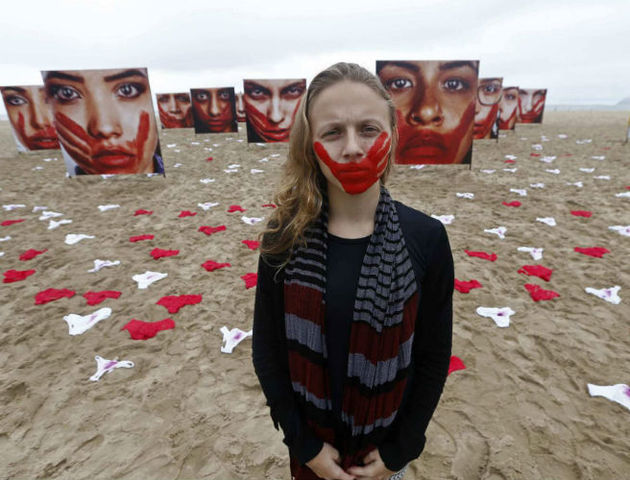Blogger and activist Clara Averbuck, who says she was sexually assaulted by an Uber driver in São Paulo, is using social media to take arms against abuse
A Brazilian feminist writer and activist who says she was sexually assaulted by an Uber driver in São Paulo has launched an online campaign after writing and posting about the attack.
Clara Averbuck’s Twitter drive is the latest in a series of digital protests that Brazilian feminists have used to denounce violence against women.
“What happened is what happens to hundreds of thousands of Brazilian women,” said Averbuck. “This is a daily situation, it’s not just Uber.”
Averbuck has a bruise on her face as a result, she says, of the driver knocking her to the ground while sexually assaulting her. She has yet to decide if she will report the attack to police.
She said that as an activist she has witnessed the shabby treatment of women reporting such attacks and is also afraid of possible reprisals.
“These crimes are very hard to denounce,” she said. “We have the issue of when you cannot prove it materially, this could come back against you, the aggressor could sue you. This has happened to various women. This is very common in the system.”
Some women have even been physically attacked by the person they accuse, she said.
Averbuck was one of the first bloggers in Brazil to become famous and has since published seven books, four of which are novels. She also runs the feminist site A Woman’s Place.
She said she was at a party in São Paulo on Sunday night when friends called an Uber to take her home. When he neared her apartment building, the driver pulled into a darkened street and attacked her.
“The driver took advantage of my vulnerable state because I had been drinking,” she said.
On Monday morning, she posted about the attack on Facebook.
“I am talking about this so that everyone who reads me knows what could happen to any woman, at any moment, and that helplessness and despair are inevitable,” she wrote. “The world is a horrible place to be a woman.”
In 2006, Brazil introduced legislation to combat violence against women: the Maria da Penha law, named after the woman who fought for years to get her husband jailed for the abuse she suffered. The law increased penalties for offenders, established special courts and police stations, and required shelters to be opened, but the problem is recurrent in this deeply conservative and macho society. In 2013, more than 4,500women were killed in Brazil.
According to a survey published in March by the Datafolha polling institute, 29% of Brazilian women had suffered verbal, physical or psychological violence in the past year, but 52% of them chose to keep quiet.
“Masculinity is constructed on violence, on domination and on subjugation of what is feminine,” Averbuck said. “It is a problem [in] Brazil.”
A growing feminist movement has increasingly used social media to campaign against abuse.
In 2014, tens of thousands of women shared photos with the caption “I don’t deserve to be raped”, after a survey showed many men blamed women for attacks. In 2015, an online campaign called My First Harassment (#primeiroassédio) was launched after lewd comments were tweeted about a teenage competitor on Brazil’s Junior MasterChef TV show.
Sinara Gumieri, a lawyer and researcher for the feminist thinktank Anis Institute of Bioethics, said many women choose not to report crimes of sexual violence for similar reasons.
“The history of how police attend women is very bad. There is a lot of discrimination, of not believing,” she said.
A spokesman for Uber said that the driver had now been barred from driving for the company.
“Uber repudiates any kind of violence against women. The partner driver was blocked and we are at the disposal of the competent authorities to collaborate with the investigations,” he said in an email.
Uber declined to provide details of how many women are attacked by its drivers each year. Some women using the hashtag #MyAbuserDriver (#MeuMotoristaAbusador)shared security techniques they adopt when using Uber, such as photographing the driver’s licence plate and sending the images to friends and partners.



